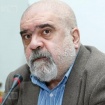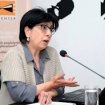Possibilities and Understanding of the Karabakh Conflict Resolution 25 Years after the Ceasefire
The online conference was held on "Public Dialogues" website (www.publicdialogues.info). It was organized within the framework of “‘Political Dialogues’ for Communication between Armenian and Azerbaijani Specialists” project, implemented by Region Research Center. This project is supported by Black Sea Trust of Regional Cooperation Marshall Fund. The Institute for Peace and Democracy (the Netherlands) is a partner to the project. The Public Dialogues website was created in 2012 by Region Research Center and the Institute for Peace and Democracy.
Participants
Alexander Iskandaryan (Armenia) – political scientist, Director of Caucasus Institute
Arif Yunusov (the Netherlands) – political scientist, Institute for Peace and Democracy
Grazvydas Yasutis (Lithuania) – guest professor, Geneva Institute of International Relations and Development
Sergey Markedonov (Russia) – leading researcher at the Center of Euro-Atlantic Security, International Studies Institute, Moscow State Institute of International Relations
Laura Baghdasaryan (Armenia) was the moderator of the conference – Diector of Region Research Center
The following issues were discussed
- The essence of the parties’ understanding of the conflict, the transformation of the perception of the settlement process as compared to the past,
- The possibility for NKR’s participation in the negotiation process from the perspective of the interest of the parties to the conflict and the effectiveness of the process, and the mediators' attitude to this,
- The mediators and their tools to prevent escalation at the front, levers of pressure by international forces to force decisions on Karabakh, the possibility of their application, the tendencies of skirmish resumption on the front in the recent months, the reasons behind these developments,
- The feasibility of expanding the composition of intermediaries involving more neutral countries,
- The impact of the domestic legitimacy of the government on the process and decision-making on the conflict,
- Negotiations as a project for peace or an element of policy pursued by the parties and other interested countries,
- The objectives behind Armenia’s message: "New War - New Territories",
- The message behind the formulation used by Azerbaijan “Territory in exchange for non-war” is blackmail addressed not only to the Armenian side, but also to countries that are not interested in military escalation in the Caucasus region,
- Problems in the implementation and the significance of humanitarian measures, declared by the parties to the conflict after the meeting in Moscow in April 2019,
- Leaving the negotiation process is reasonable from the point of view of the interests of the parties,
- Public perceptions and public attitudes in the context of the Karabakh conflict.
The internet conference was held in Russian, here we present some excerpts in English. Read the full text of the online conference HERE.
Laura Baghdasaryan - About two weeks ago, it was 25 years since the signing of the Agreement on the cease-fire in the Karabakh conflict zone. The negotiation process has since developed in a zigzag manner, but it did not reach any final arrangements on a peace settlement, and it did not get to the point when one of the parties would leave the negotiations. The parties went to negotiations, clearly realizing that much would be impossible







 +37410 563363
+37410 563363
 1/3 Buzand Str, 8 Floor, Yerevan, Armenia
1/3 Buzand Str, 8 Floor, Yerevan, Armenia